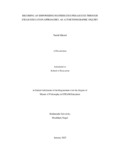
Please use this identifier to cite or link to this item:
https://hdl.handle.net/20.500.14301/505| Title: | Becoming an Empowering Mathematics Pedagogue Through STEAM Education Approaches: An Autoethnographic Inquiry. |
| Authors: | Khanal, Tamlal |
| Citation: | Khanal, T.(2025).Becoming an empowering mathematics pedagogue through STEAM education approaches: An aAutoethnographic inquiry. |
| Issue Date: | Jan-2025 |
| Publisher: | Kathmandu University School of Education |
| School: | SOED |
| Department: | DOSE |
| Level: | M.Phil. |
| Program: | MPhil in STEAM Educaiton |
| Abstract: | From my long period of teaching experience as a mathematics teacher/lecturer, I found that most of the students are not satisfied with mathematics and mathematics related disciplines because the learning process is considered as the disciplinary knowledge transmitter from the teacher’s heads to the student’s means that (we) teacher do not act as our context as required. However, we have been guided through a conventional rather than a growth mindset in our teaching and learning process. For example, practice makes a student perfect; be aware of this final exam question! etc. The monotonous teaching in the classroom and the rigid ways of teaching hampers the creative ways of the learning process. Our teaching tendency at our lower grades (school) is embedded as in the university in the context of pedagogy (Lecture Method). Hence, I focused on accessing and empowering mathematics teaching learning activities by enhancing learners' foundation through different pedagogical practices. Those experiences of teaching and learning inside and outside of the classrooms presented as the transmitter teacher gave them only the theoretical knowledge in a controlled class environment. From the eye of an autoethnographer, I have primarily selected two avenues to approach the research goal of conventional/empowering pedagogues through different social settings. For the balance of conventional and empowering pedagogue (me), the emerging discourse of STEAM as a multidisciplinary/transdisciplinary approach in pedagogical practice intuited me to pause and reflect on my pedagogical journey. Further, I realized that the cause of the difficulty in mathematics is a lack of prior mathematical knowledge. So, by applying STEAM projects in the classroom, I considered the condition that the students have basic mathematical skills while teaching mathematics. The STEAM approach is a multidisciplinary learning approach that supports the emergence of new knowledge and learning with the attachment of different disciplines inside the same world and a hands-on innovation process. Critical constructivist thought is too important for the innovation process in this research because it helped in many critical aspects of my research. This approach helps students develop mathematical skills and abilities necessary for success in a rapidly evolving, interdisciplinary world. After unpacking and critically reflecting on the various events and incidents of my pedagogical journey so far, I have tried to come up with some possible improvements in my/our pedagogies towards a pragmatic way in mathematics. The major significance of this research is to improve the mathematics classroom through the emerging pedagogies in a synergetic way or by emphasizing the holistic meaning making process (STEAM). Also, this study assists the teachers, experts, curriculum planners, and policymakers in understanding the existing situation and practices of social justice in mathematics classrooms. It gives insights for transforming teaching methods, reforming curriculum, and promoting democratic justice in the classroom. The ultimate goal of my research was to empower the learner through transformative pedagogy in the mathematics classroom. To achieve the transformative goal, I also critically evaluated my deep-rooted beliefs. |
| URI: | https://hdl.handle.net/20.500.14301/505 |
| Appears in Collections: | Dissertation |
Files in This Item:
| File | Description | Size | Format | |
|---|---|---|---|---|
| Tamlal Khanal Mhil_Dissertation Final 2025.pdf | 2.08 MB | Adobe PDF |  View/Open |
Items in DSpace are protected by copyright, with all rights reserved, unless otherwise indicated.